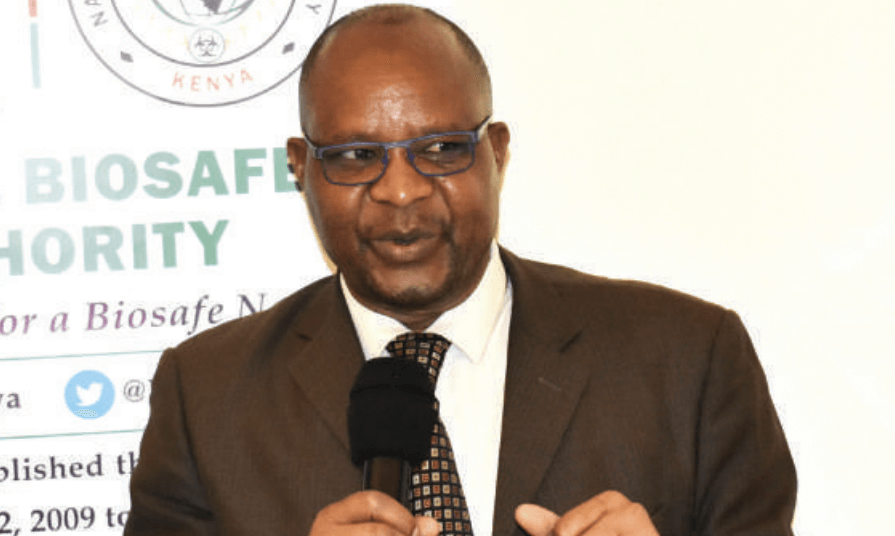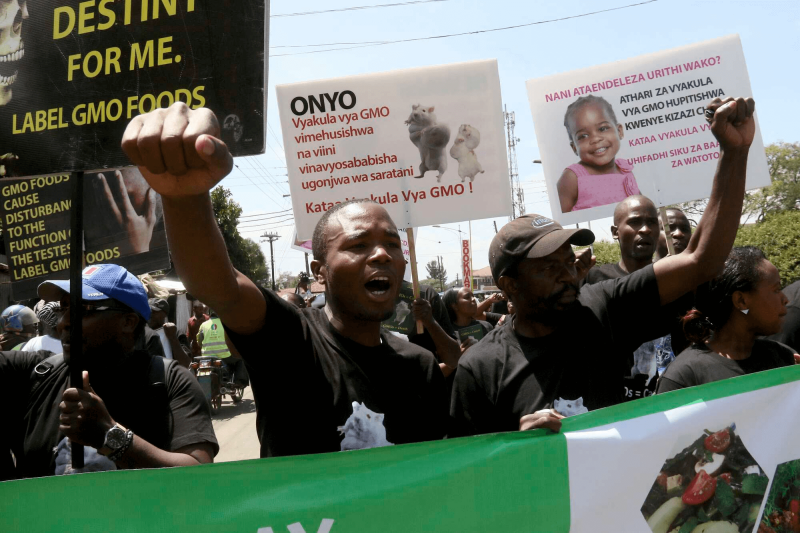Are anti-biotechnology advocacy groups honestly engaging in science in their attacks on genetically modified crops?
Professor Richard Oduor, a scientist and chairman of the Kenya University Biotechnology Consortium (KUBICO), says ‘no’. According to Oduor, activists and politicians exploit unprincipled disagreements among scientists on GMOs, to mislead the public that the genetic engineering science isn’t safe and causes cancer.
“It is unfortunate that there are voices giving imaginary side-effects; that this GMO will make you sleepy; this one causes stomachache and that one leads to cancer; it is very unfortunate,” he added.
A riled Oduor added that it is now trendy to hear voices in Kenya that are loud but not helpful in solving threats of virulent pests and diseases, and frequent and prolonged droughts from climate change.
We need public participation and input. As scientists [we recognize] it’s the public that presents their challenges for approvals. [For] 10 years [2012-2022] we’ve been telling the government to allow us to experiment the technology and [we’ve] been getting financing from the National Research Fund [of the Government of Kenya … to develop GM-crops.
He urged scientists to become more involved in the public debate. “We scientists talk to each other when we’re on the platform of science, but when it involves talking to the public, then we have to get down to the level of the public… And when you hear the way the public is talking; the way we’re watching, it is really a challenge to us….”
KUBICO was established specifically to help address such communication challenges. It brings together experts on biotechnology from the public and private universities where they advance safe application of modern biotechnology, Oduor said.
Through KUBICO, we ourselves do peer-reviewing and that’s how science grows…. It takes 15 years to get a fully-grown/developed genetically modified plant/crop. It’s a complimentary solution, to many others… so nobody should claim we’re rushing.
A biosafety conference that was planned in Nairobi towards the end of 2022, has been put on hold, partly because of ruthless attacks on science and the anticipated escalation of anti-GMO activities that would cause disruptions. According to Oduor, science-based teams are doing their best to address issues, including strengthening universities and engaging with opposing sides. Kenyans are against GMOs due to all the misinformation that has circulated for so long!
Opposition response
Emmanuel Atamba, with the anti-GMO CSO (civil society organization) the Roots to Food, challenged Oduor during the Citizen TV debate, that Kenyan scientists are championing what is not theirs. “Whatever is coming we have no control, they’re not ours. [Like] the seeds coming from South Africa. When [insect-resistant GM] Bt-cotton was allowed in 2019, farmers were promised heaven…., but I don’t hear of success stories from Bt-cotton farmers…,” Atamba alleged.
He also tried to raise doubts about GM seed technology arguing that whereas he could take COVID-19 vaccines developed by private corporations using genetic engineering, he wouldn’t consume crops developed the same way: a divisive issue in Kenya. “I’m never going to grow GMOs… whatever is coming in, we do not have control. The Bt-cotton seeds we’re growing are from Mayhco, a subsidiary of Monsanto ….”
Dr. Roy Mugiira, the CEO at Kenya’s National Biosafety Authority (NBA), challenged Atamba’s dismissal of the GM cotton, which has resulted in a sharp reduction in the use of insecticides. “He’s alleging that Bt-cotton has been a failure, I wouldn’t associate with such baseless allegations…,” Mugiira stated.

The National Biosafety Authority (NBA) said it was established by the Biosafety Act No. 2 of 2009 to exercise general supervision and control over the transfer, handling and use of genetically modified organisms (GMOs). GMOs, it adds, are products of Modern Biotechnology that involves manipulation of the genetic material of organisms through genetic engineering procedures.
“The objective and purpose for which the Authority was established is to regulate research and commercial activities involving GMOs with a view to ensuring safety of human and animal health and provision of an adequate level of protection of the environment. To achieve this objective, the Authority shall establish a transparent science-based and predictable process to guide decision making on applications for approval of research and commercial activities involving GMOs,” it states on its official website .
Another Kenya-based anti-GMO entity, the CitizenGO, launched an online petition urging the president to withdraw the directive lifting the ban of GMOs:
Scientists are still studying the field of GMOs as it is rather an intricate one and involves a lot of risks. Some risks associated with the consumption of GMOs include infertility, cancer, low immunity, allergies and anti-bacterial resistance… scientists have identified risks associated with GMOs and their importation is equal to the importation of death….”
Misrepresenting risks of GM seed development
Local groups are exploiting the confusion over routine guidance manuals that accompany ‘hazardous research’ — which GM research is not. The decades-old European-developed Standard Operating Procedures (SOPs) recommends that nuclear scientists use lab jackets, gumboots, gloves, CFT biosecurity measures, 24-hour armed guards on duty and CCTV-surveillance cameras, in some cases are also used in GMO-research and development facilities, as if working in nuclear waste/hazard infested environments.
Antis claim incorrectly that these precautions are necessary for research on GM seeds, and the scare tactic is working. The claim genetically-altered seeds “may spill” in a country where they’re in transit to a destiny country….” [misrepresenting that seeds or plantlets or cells are like crude oil or hazardous chemical or nuclear wastes and can spill, pollute the environment and persist in it]!
Many local anti-groups are guided, and in some cases funded, by European activists. European governments have looked the other way as these groups divert the funding they EU gives to subsidize environmental protection/conservation and human rights advocacy work, to do anti-GMO activities.
Local activists mimic European activist-designed and sponsored anti-biotechnology myths, claiming ‘GMOs are inorganic, carcinogenic and toxic, expensive to develop and acquire, unaffordable and inaccessible to smallholder subsistence farmers. Their claims carry some weight with confused consumers, as various EU nations still reject GMO foods for human consumption, including France, Scotland, Italy and Germany. One analyst argued:
“Whenever anything happens in favor of modern biotech, the ‘ghosts’ wake up. Not that they’ve been asleep, but they’d have been working underground, while nobody was talking or acting in favor of GM-technology. It is only and only when talking or acting in favor of GM-technology happens, that you’ll see them rise and run all over. They never want anything progressive in the Ag-science and technology sector to happen, or else they’d have no needy cases to present to their foreign financiers [EU anti-GMO groups].”
How scientists are fighting back against GM crop disinformation
When you genetically modify for tolerance/resistance to their most destructive constraints (diseases, pests and drought) in maize, cotton, cassava and banana crops – grown by majority of farming communities, you contribute to enhancement of two key pillars of peasant-farmers’ life: food and income securities.
Food security
When the most ferocious pests and diseases that damage or destroy staple food crops are controlled using modern biotech intervention, higher yields are realized. Many anti-GMO activists are upset that they are being upstaged by scientists in their misleading claims about the causes of the current crisis of poor yields, food shortages and famine, which they use to raise money from philanthropists. Biotech scientists are now aggressively challenging these claims, and there are some signs that farmers are listening.
Income security
Food crops are today also cash crops, whereby when there’s good quality and quantity harvests, the peasants have enough to eat and extra to sell for money. That success reduces dependency on NGOs, government and politicians, as they no longer must beg and peg their survival on others. Some peasants say they see a drive by some anti-GM forces to dominate, subjugate and exploit Africans sustainably, forever. That’s infuriating anti-GM NGOs, who have thrived by pushing misinformation and conspiracy theories.
The push against anti-campaigns is growing. One analyst involved in what she termed “the struggle to reduce gullibility and vulnerability of our communities” and promote scientific work to create resilience in our crops and communities, says there’s need for continuous GMO-education by scientists.
The Kenya Government said its decision to lift the ban is a medium to long-term response to the ongoing drought and a progressive step towards significantly redefining agriculture in Kenya by adopting crops that are resistant to pests and disease.
[T]he executive action opened cultivation and importation of white GM maize is now authorized …. It follows a December 2019 decision to approve research on the commercialization of insect-resistant bacillus thuringiensis (BT) cotton hybrids, which is a genetically enhanced variety resistant to the African bollworm, the most destructive and pervasive pest in cotton farming.
That earlier approval by cabinet sought to revamp production of textiles, apparel, feed, and oil-industries towards the realization of the industrialization. T[his] cabinet decision builds on it and extends its benefits to other agricultural and manufacturing sectors.
Peter Wamboga-Mugirya, Director, Communication and Partnerships, Science Foundation for Livelihoods and Development (Scifode), and Executive Member of the Uganda Science Journalists’ Association (USJA).































